Posts by Dr. Karen Finn
How To Co-Parent With The Enemy
You can’t co-parent if you’re still waging war. Your kids deserve much better from you.
Some divorces are easy. Unfortunately, most aren’t. Most divorces are really, really hard to get through. And the worst ones? Those are the ones where the divorce became a war and the former spouses still view each other as the enemy because they know in their guts that the divorce was just one battle.
And after the divorce is final, the kids (and their affection) become the next battle. One of the former spouses will win and the other will lose. But the problem is the kids will lose too.
If you see your ex as the enemy, it can seem nearly impossible to co-parent with them yet somehow that’s exactly what you need to do: figure out how to co-parent with the enemy.
Sure, you’ve read all kinds of how to co-parent articles and books, but few if any help because they’re either too superficial or they assume you and your ex had this easy-peasy divorce where you’re still best friends. How unhelpful is that?!
So where do you need to start on your journey of learning how to co-parent with the enemy?
Right here.
You must decide that you’ll put your kids’ best interests BEFORE the battle and your need to ultimately win the war. As much as it grates on you to stop the fighting, you know the truth is kids do best when they have both parents in their lives.
(Unless, of course, your ex is abusive and the courts have stepped in to help matters. But if that were the case you probably wouldn’t be reading this article.)
Do you love your kids? Then, do what’s best for them – not what you’re telling yourself is best for them, but what’s really best for them and choose to co-parent with their other parent.
Yup, the first thing you need to do is stop viewing your ex as the enemy. Instead view them as your children’s other parent.
One of the easiest ways to start doing this is to change their contact information from “Satan” or whatever name you’ve already changed it to to “Kids’ Mom” or “Kids’ Dad”. This incredibly simple edit will remind you of your decision to put the needs of your children first whenever their other parent contacts you.
The next step is to establish ground rules for communication and stick to them. It’s likely you’ve already heard this suggestion while you were going through your divorce, but if you’re still waging war, then you’re probably still ignoring the suggestion.
Well, it’s time to get serious about being the parent your children need and deserve. Decide what types of communication will happen by email (usually the non-urgent things), which will happen by a call, and which will happen by text. Let your ex know that you’ll be following these guidelines and that you expect them to do the same.
What if they don’t? Well, then when you have the kids, you can block their other parent’s number and enjoy being with your children. Eventually, the poor communication will stop, but you have to take the lead on this.
Finally, you need to schedule regular co-parenting meetings that you run like a business meeting. Yup, you have an agenda that you stick to when you talk the important stuff to make sure your kids are receiving the best from both of you.
And if these meetings are too difficult, then work with a family therapist to help make sure you’re doing your best to meet the responsibilities you have in learning how to co-parent effectively.
Will this be easy? Probably not, but there’s a chance that it will. When you make up your mind that you will be the best parent you can possibly be you just might surprise yourself by how quickly you stop viewing your ex as the enemy and instead as your partner in raising your amazing children.
I’m Dr. Karen Finn, a divorce coach and advisor helping people just like you who are struggling with how to co-parent among all the other challenges of healing after divorce. You can join my newsletter list for free weekly advice. If you’re interested in taking the first step toward working with me, you can schedule an introductory private coaching session.
Looking for more help with parenting after divorce? You’ll find what you’re looking for in Coparenting.
15 Hilarious Quotes To Help You Get Over Your Divorce With A SMILE
Laughter really is the BEST medicine.
Disbelief. Hurt. Loneliness. Heartbreak. Anger. These are just some of the most difficult emotions you feel during divorce.
It’s not that you’ve never felt any of them before. It’s more like on a scale of 1 to 10, the intensity of each is a 20. And, you’re experiencing them all at the exact same time, which feels debilitating and frightening.
When I was going through my divorce, there were times I wondered if I was going insane. And other times, I’d even have a fleeting question about whether I’d be better off if I took my own life.
These aren’t funny emotions and your divorce isn’t (necessarily) a source of comedy. But what if you could laugh (at least a little) about your situation or someone else’s? It’s OK to find something funny about what’s going on — even if it’s at your ex’s expense. Heck, especially if it’s at your ex’s expense!
Research studies tell us time and again about the benefits of laughter. We’re told laughter is the best medicine, with plenty of physical, mental and social benefits to laughter including: attracting others to us, easing anxiety and fear, and lowering stress hormones. (And who couldn’t use that while dealing with divorce?)
But, did you know that laughter can actually help dissipate anger?
In fact, comedians frequently use their anger to develop their best comedy routines. By finding the funny in your divorce, you’ll be taking the sting out of it and give yourself a boost of feel-good hormones. And I don’t know anyone who’s going through divorce that couldn’t use a break from all the heartbreak and a good laugh.
So, all the data is here. Laughing about your divorce is GOOD for you. But, if you’re still not sure you can find something funny about it, here are some hilarious funny quotes to help get you giggling.
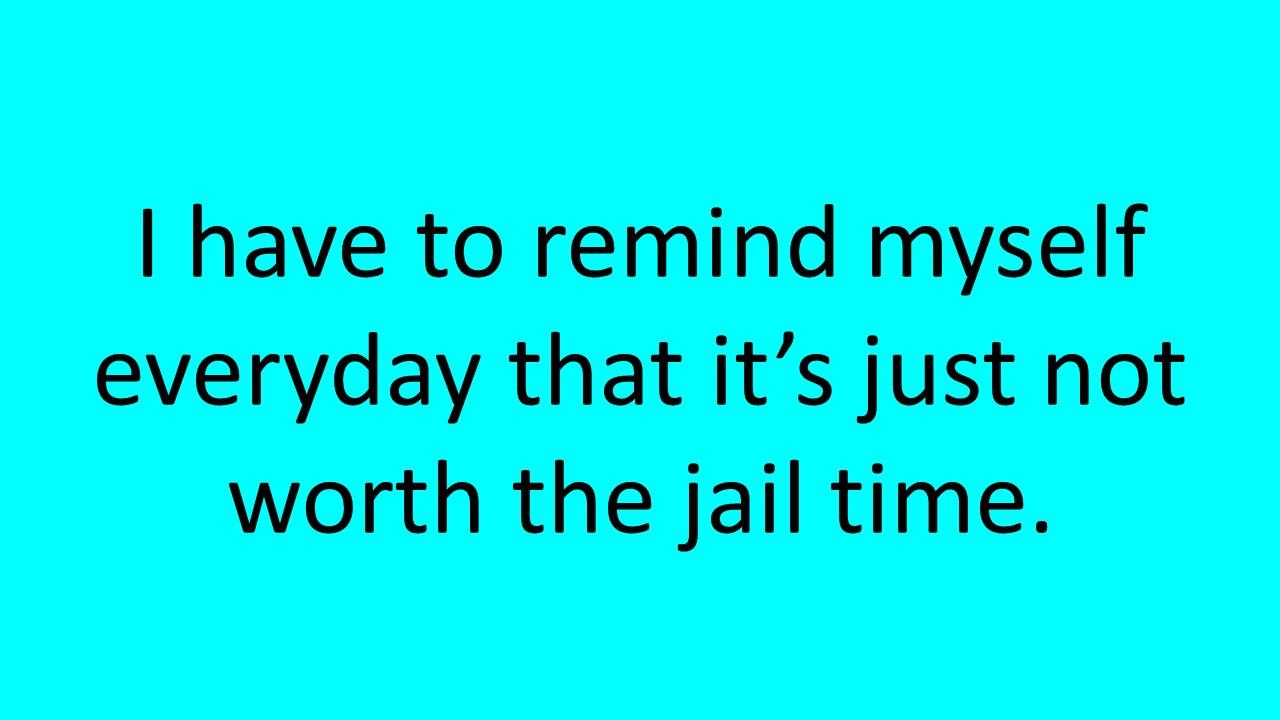
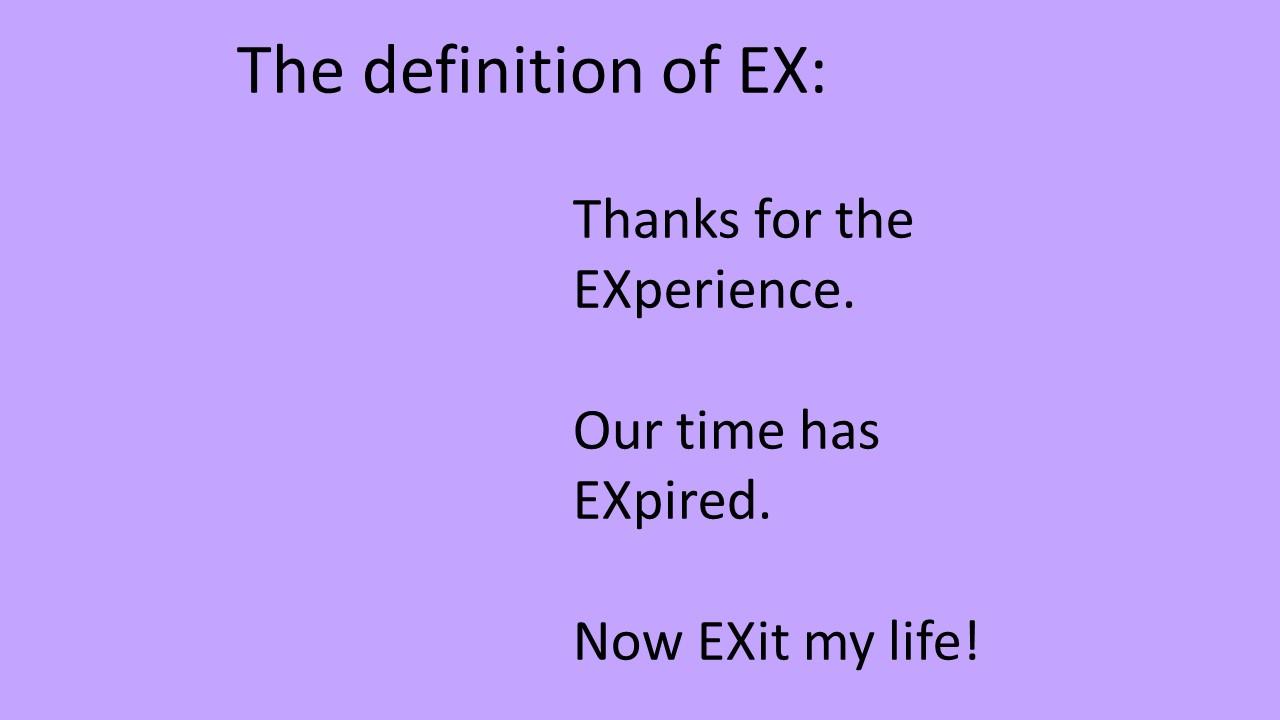
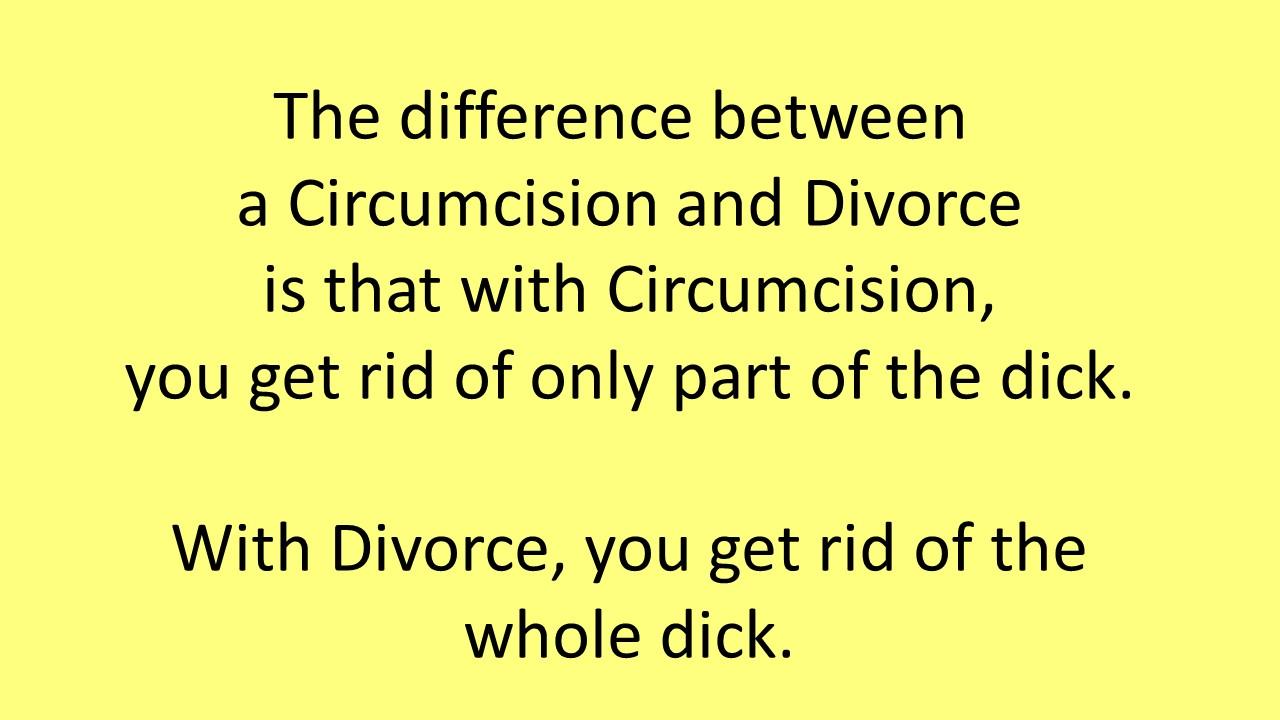

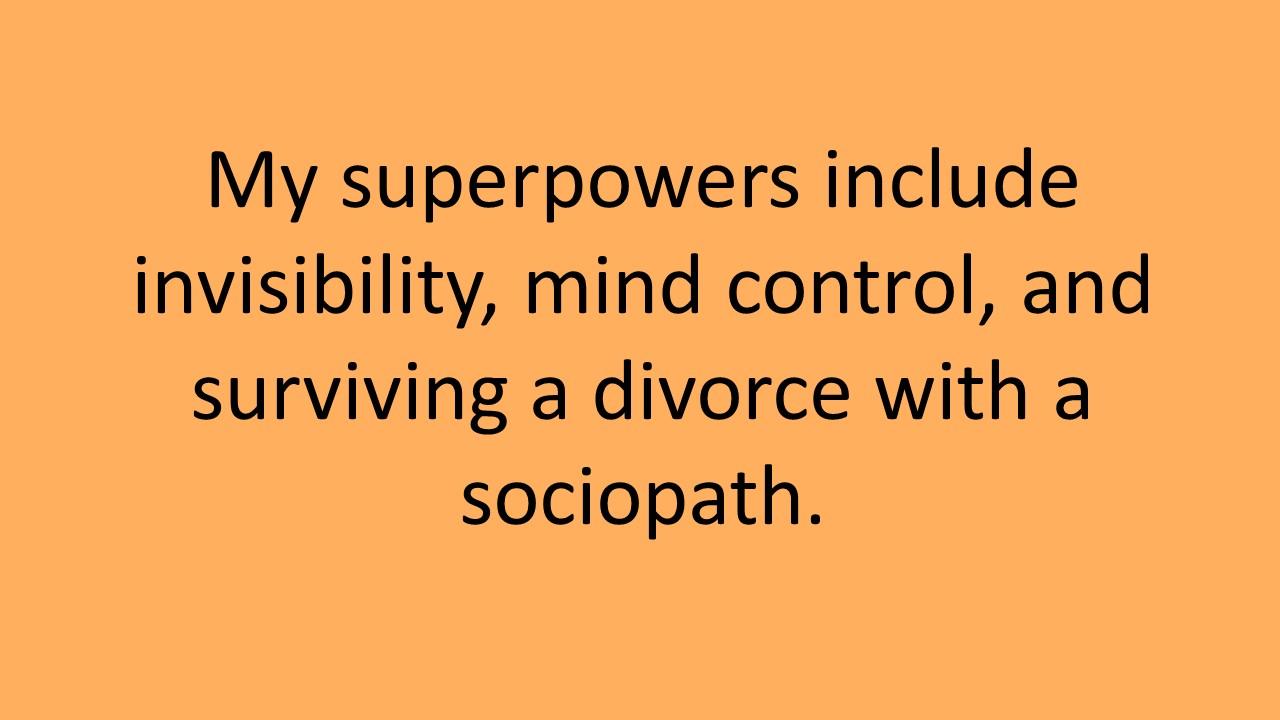

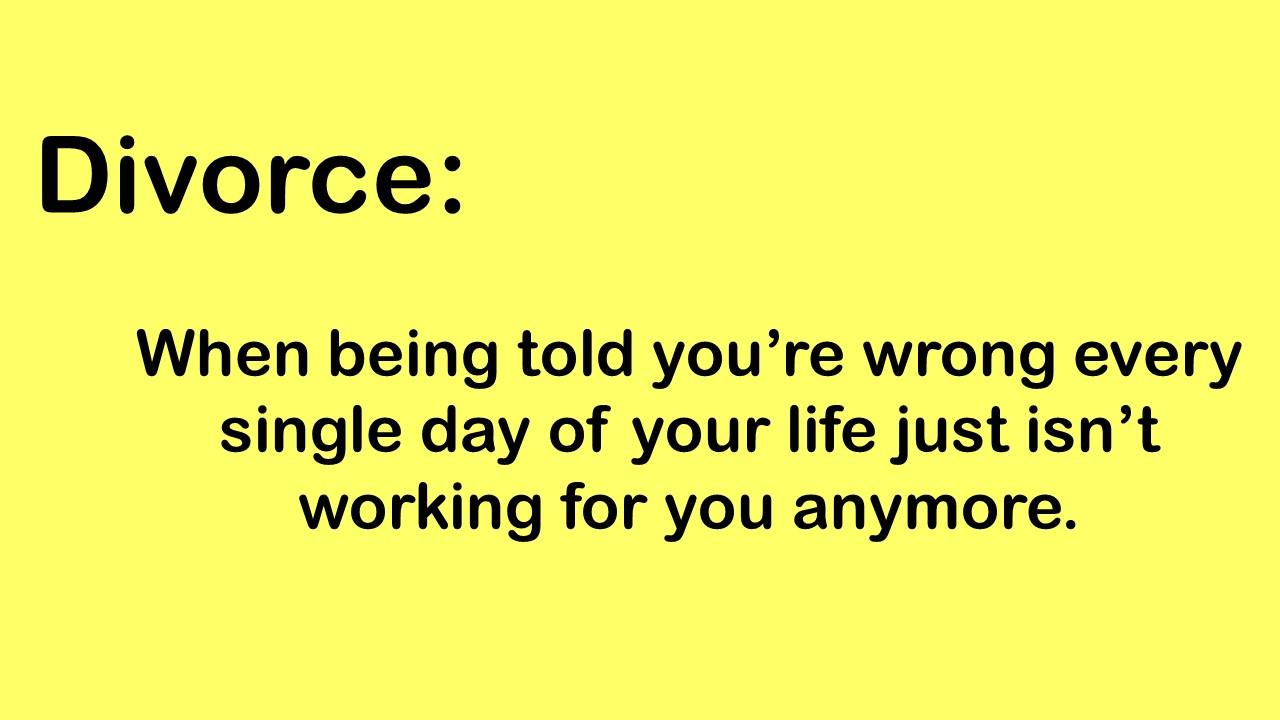

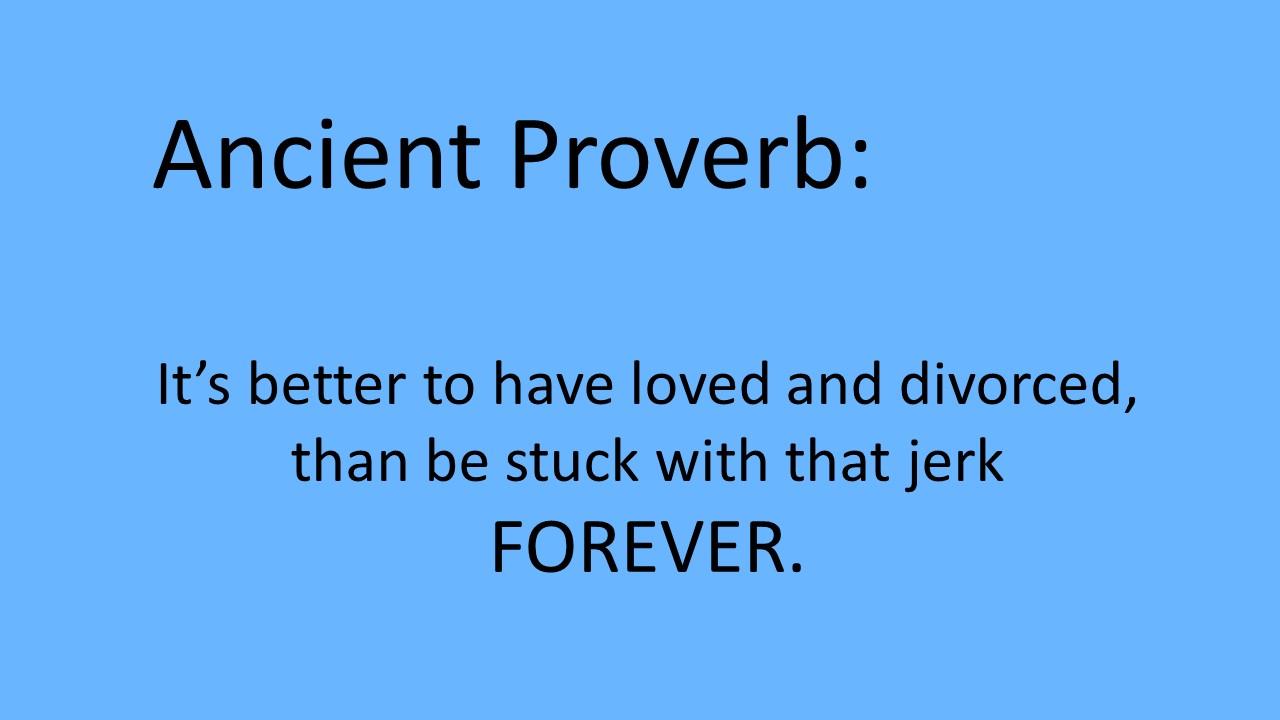
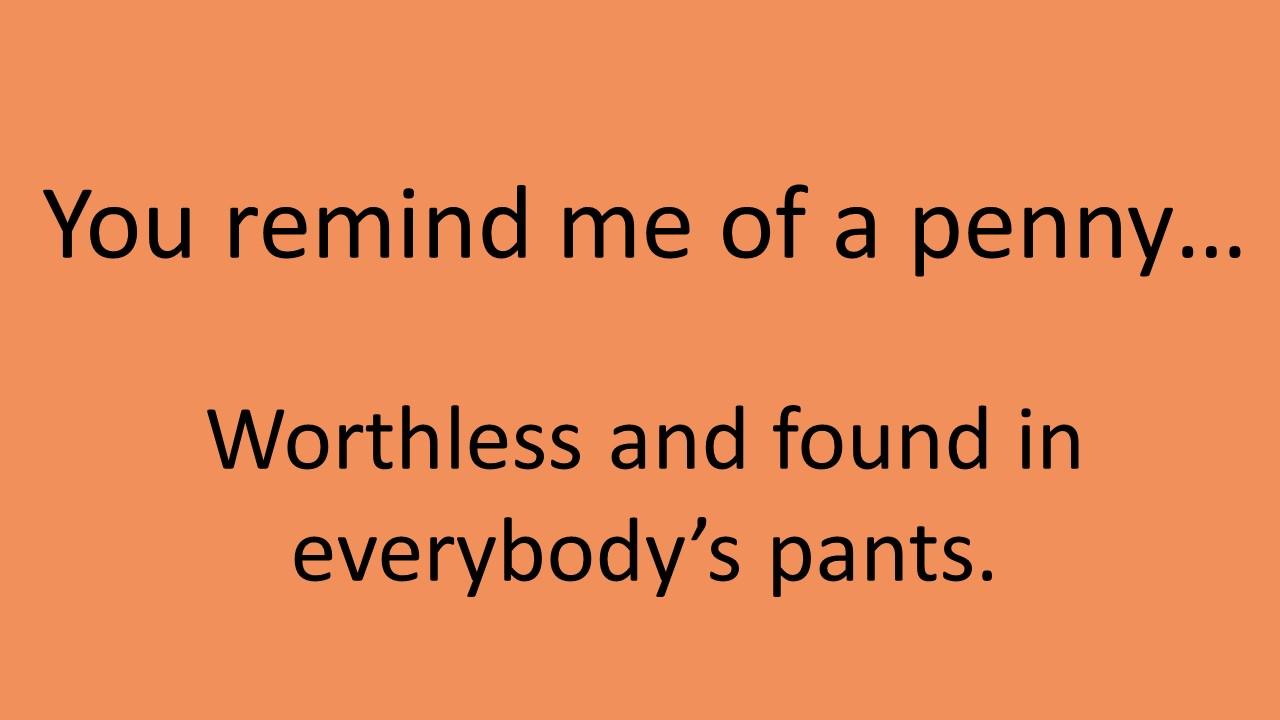
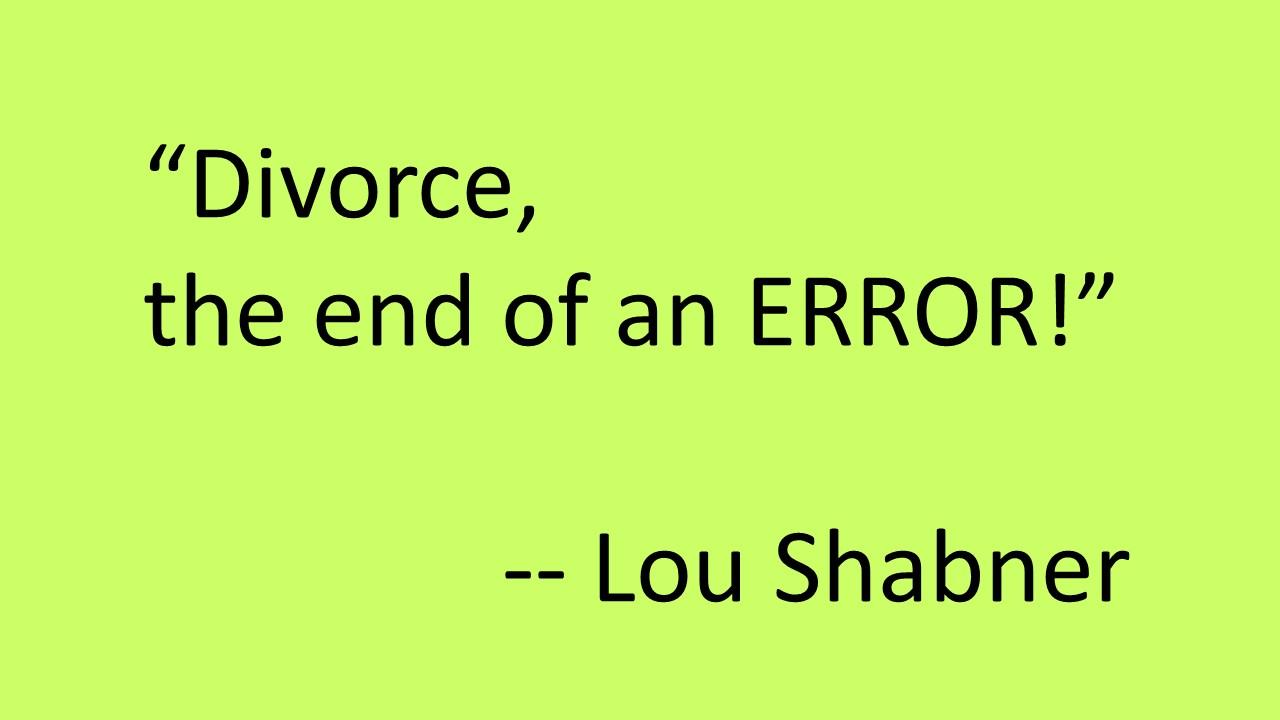
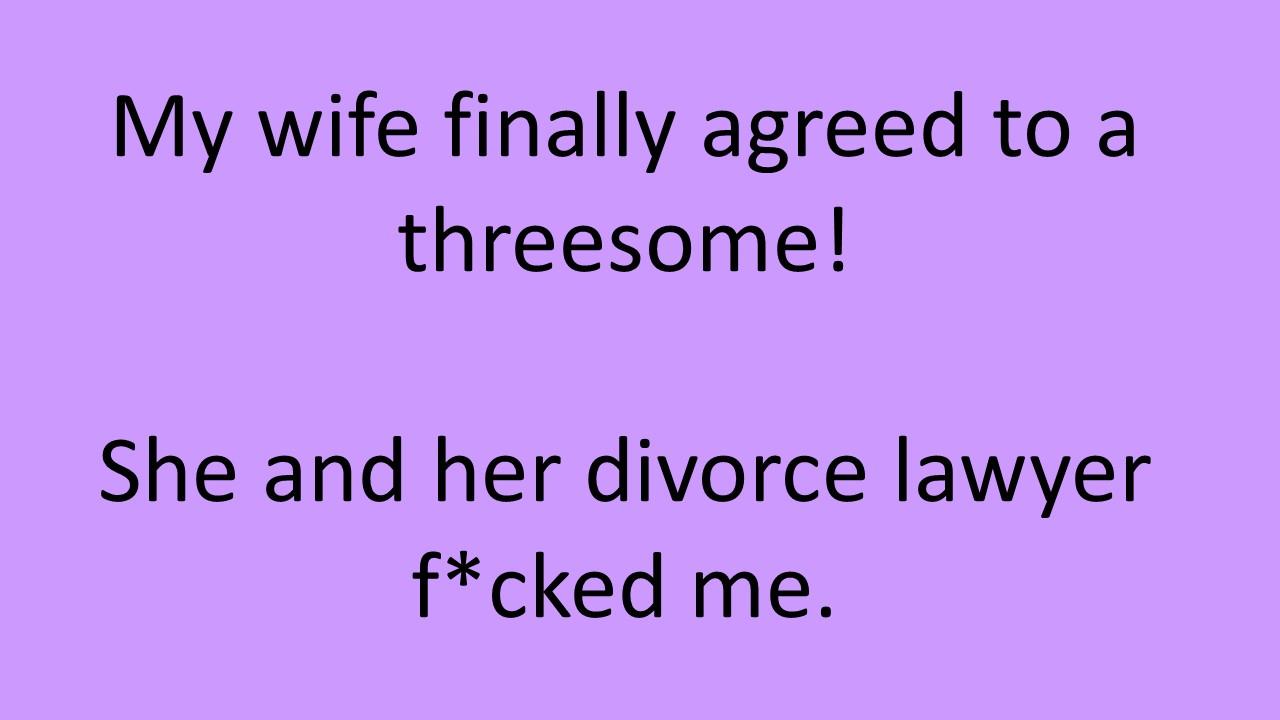

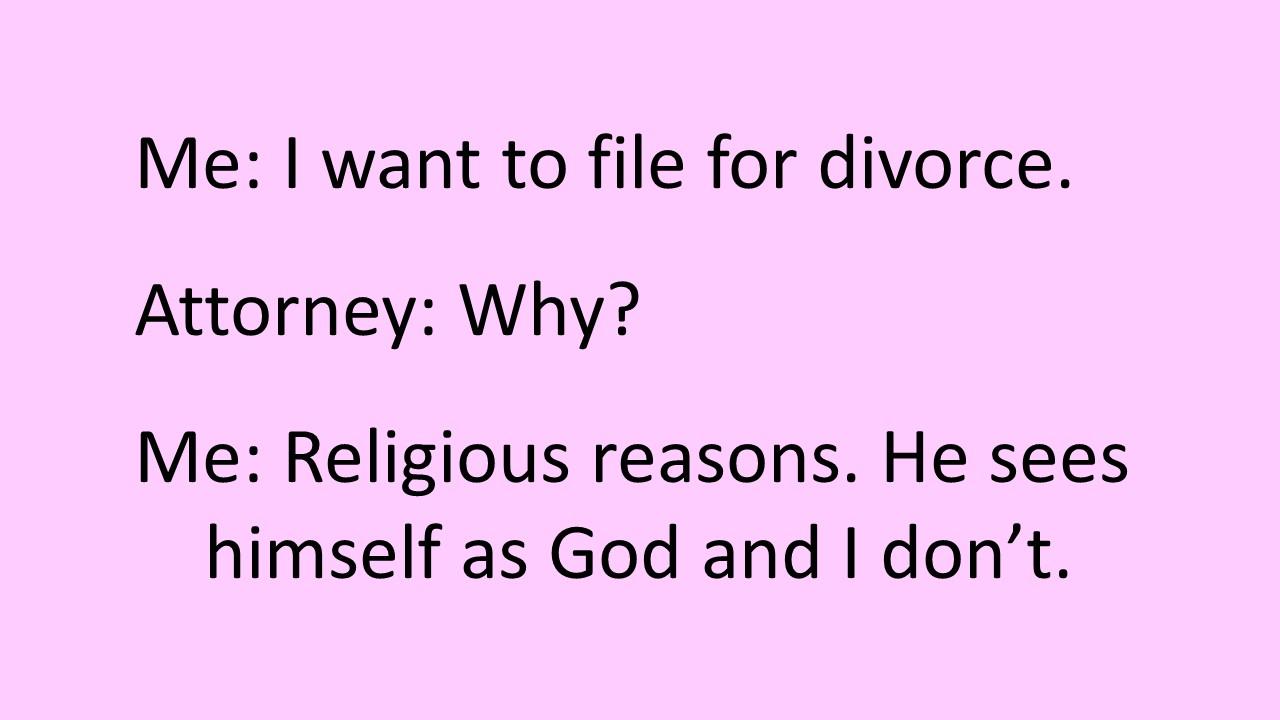
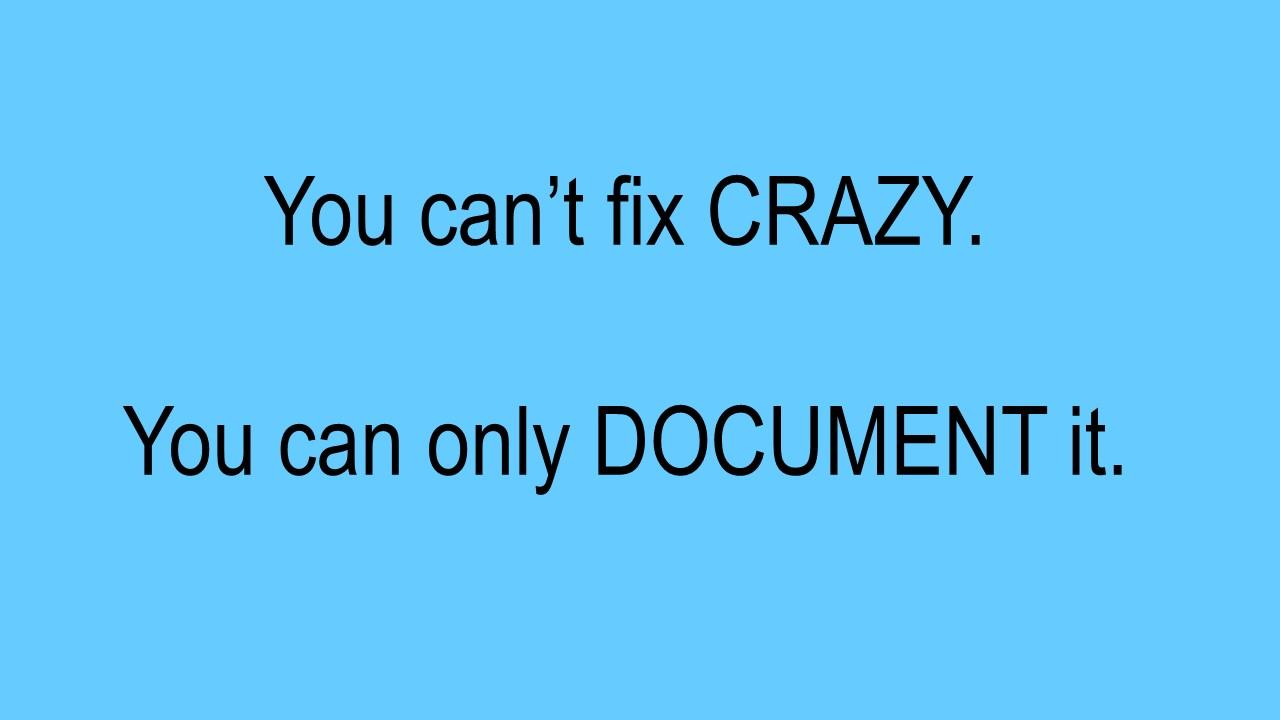
I’m Dr. Karen Finn, a divorce coach and advisor. I work with clients just like you who are struggling as they deal with fear and grief after divorce. You can join my newsletter list for free weekly advice. And if you’re interested in taking the first step toward working with me, you can schedule an introductory private coaching session.
Looking for more help to get over your divorce? You’ll find what you’re looking for in Dealing With Grief.
This article originally appeared on YourTango.
I Became My Own Divorce Superhero And Rescued Myself From Fear
Divorce scared the hell out of me. Until I decided to face that fear head on.
Numb and terrified. I spent so much time scared out of my mind after my divorce, worrying about what might happen to me. My nightmares were so bad, I hardly slept. And eating wasn’t happening much either, as I constantly felt nauseous and without an appetite. My thoughts looped around a racetrack, imagining one possible catastrophe that might befall me after another. I felt completely helpless to change any of it, but as strange as it sounds, I felt the best in moments when I could finally be numb.
They say that you have to hit rock bottom before you can make the hard choices required to truly change your life. For me to get through my divorce, that’s exactly what I needed—to hit rock bottom. Only then could I start to grasp the idea that I deserved to be free from the tyranny of my thoughts and fears, and that I had to choose to overcome them, no matter what. I realized at one point that there was no magic wand to be found, no fairy godmother on her way, no knight in shining armor about to sweep into my life and make everything all better. There was only me … very scared, very alone me.
So, I made a decision to become my own superhero and do whatever needed to be done in order to free myself from the clutches of fear that I had allowed myself to fall captive to in my life. No, I didn’t start wearing a cape or a sassy spandex outfit, but I did start showing up more boldly for myself, handling the things that needed to be faced in order to get through my divorce.
How did I start being my own superhero?
I realized (finally) that, as much as I wanted my therapist, or someone from my divorce support group, or one of my family members, or one of my friends to magically pull me free of the numbness and misery, they couldn’t. And it wasn’t their job to. Their job was to support me and point me toward helpful information along the way. My job was to pay attention to that information and start thinking differently so I could behave differently. My job was to realize that I was not a victim any longer (unless I chose to be). My job was to be the superhero of my own life.
Once I accepted that it was me and only me on the Karen Rescue Squad, I realized I needed to build my faith. For me, that meant putting my trust in something bigger than myself (or at least bigger than I felt at that particular time) that was also still part of me—in other words, God. Despite part of me being terrified that God was going to “smite” me because I was getting divorced, I still found a way to recite the first verse of the Serenity Prayer over and over again every time I found myself tossing and turning in bed. Over time, this prayer (which is about appropriate personal power) became a balm and a comfort to me. I began to sleep again—and sleep was something that I desperately needed.
Some might argue that my reaching out to God was still looking outside of myself for a rescuer, but that’s not how it worked for me. I wasn’t escaping. I used faith and God to help focus me and harness my inner power. By reminding myself that I came from something bigger and better, I felt strong enough to rise into bigger and better. And, in doing so, I began releasing myself from my prison of victimhood and using all of the resources and talents available to me.
As my strength grew, I was able to start hearing more of the helpful information people were sharing with me.
Because most people thought I was extremely fragile, they were afraid to be frank with me. Many people said things like “you’re looking thin,” but one friend loved me enough to be blunt, saying without preamble and quite simply, “You’re anorexic!”
When he said that, I panicked. I didn’t have an eating disorder (did I?). How dare he say that about me? I was furious and ran to the bathroom. A few women in there were thinner than me, which meant I was okay, right? Wrong. Although it was one of the hardest things for me to hear, deep down I knew my friend was right. I’m 5-foot, 5-1/2-inches tall and I barely weighed 100 pounds. I was able to shop in the children’s department for my t-shirts and had a hard time finding adult clothes that fit me. I was anorexic.
After about 10 minutes of coming to grips with what he said, I went back out to where he was patiently waiting for me. Despite my anger that was just covering up my intense fear, we were able to have a real conversation. I was able to commit to an eating plan that helped me start my road back to better nutrition. With the improvements in my sleep and getting better nutrition, I was able to think more clearly, emerge from the numbness and start to fully embrace my role as my personal superhero. But, there was still a lot to do.
I took stock of my strengths and weaknesses and realized that I’d been living my life to please others. It turned out that getting divorced was just the first in a long line of scary decisions I needed to make to rescue “me”. You may think once a superhero, always a superhero, and to some extent you’re correct, but each one of those scary decisions needing to be made were a challenge for me, requiring me to dig deep to find new stores of courage within myself. Each challenge was another chance to choose myself.
Even now, I still fall prey to a victim mentality from time to time. In those moments, I once again consciously choose to be a superhero, to step outside of my comfort zone, to resist blaming someone or something else, and to keep my eyes always searching for the good (because there is always good to be found) in even the most challenging situations.
I’m Dr. Karen Finn, a divorce coach and advisor. I work with clients just like you who are struggling as they deal with fear and grief after divorce. You can join my newsletter list for free weekly advice. And if you’re interested in taking the first step toward working with me, you can schedule an introductory private coaching session.
Looking for more help in getting over your divorce? You’ll find what you’re looking for in Dealing With Grief.
This piece was originally published at YourTango.com.
Struggling With Thoughts Of Reconciliation Post-Divorce?
Don’t worry, those thoughts are normal – whether they’re wanted or not.
They’re confusing, frustrating and add to the horrible mess of wondering if the whole divorce thing has finally driven you mad.
What I want you to know is that thoughts of reconciliation are completely normal when you’re dealing with grief after divorce.
So take a deep breath, relax knowing that you’re still sane as you read on to understand what’s up with those bizarre (and usually unwelcome) thoughts of reconciliation that are popping into your head.
Dealing with grief after divorce is a complicated thing. It’s lots different than dealing with grief after a death. Death is final. You’ll never look that person in the eyes again.
After divorce, you have the opportunity to look your ex in the eyes each and every time you hand the kids off and/or at each major event in the kids’ lives (think graduation, marriage, grandchildren, accepting a Nobel Prize, etc.). So finding closure after divorce is difficult and makes the whole dealing with grief thing more challenging.
Regardless of the grief you’re experiencing, you’re likely to go through the 5 stages of grief identified by Elisabeth Kübler-Ross:
- Denial and Isolation
- Anger
- Bargaining
- Depression
- Acceptance
Take a good look at 3. Bargaining. That’s what those thoughts of reconciliation and getting back with your ex could be about – especially if you’ve gone to the point of asking (OK, maybe it’s more like begging) your ex to take you back. And if so, they’re just a normal part of dealing with grief post separation and divorce.
Many people have fantasies of how their life would be if the divorce had never happened. They’ll start dreaming of getting back together with their ex.
When we’re in pain, our brains start doing what they’re fabulous at – problem solving! They’ll come up with all kinds of ideas (and, yes, some of them are really weird) for getting us out of that pain.
I had all kinds of strange thoughts when I was working through the grief of my divorce. One of the recurring (and thankfully fleeting) ideas I had when I was dealing with grief post-divorce was suicide. Other times I’d think about reconciliation. The thoughts kept coming and coming and coming and coming.
Obviously some of the ideas I came up with were better than others. It took real effort to sort through all of them. And I’ll bet you’re experiencing something similar.
With all of those ideas your brain is coming up with about how to solve the pain of dealing with grief, it’s really easy to start seriously considering reconciliation as a viable option. And the reason it’s so easy is because we all have a tendency to view our pasts with rose-colored glasses. According to Richard Walker, Ph.D, “People have an inherent bias to view their experiences in a positive light.”
What Walker discovered after reviewing 12 different studies is that we all tend to remember happier emotions longer than negative ones. The negative ones just tend to fade faster. (Unless a person suffers from depression, then both their positive and negative emotions fade at the same rate.)
So, as time goes by, it’s easier to remember the good times in your marriage than it is to remember the bad times. And this fading effect can make the idea of reconciliation much more palatable.
Finally, you might be thinking about reconciliation because the divorce was the kick in the pants you needed to want to put in the effort to fix the issues that caused the divorce. (If that’s the case, then you’ve got A LOT of work ahead of you.)
For most of us, dealing with grief post-divorce is one of the most excruciating experiences we’ll ever face. We feel like we’re the only ones going through all of the confusing and conflicting emotions – not to mention the worries about whether or not we’ve lost our sanity along with our marriage.
But thoughts of reconciliation being better than continuing to deal with the grief and healing after divorce are common and normal. So just get curious about which of the causes above are really behind the thoughts and you’ll be able to deal with those thoughts of reconciliation in the midst of dealing with grief more easily.
I’m Dr. Karen Finn, a divorce coach and advisor. I work with clients just like you who are struggling with dealing with grief after their divorce. You can join my newsletter list for free weekly advice. And if you’re interested in taking the first step toward working with me, you can schedule an introductory private coaching session.
Looking for more help in getting over your divorce? You’ll find what you’re looking for in Dealing With Grief.
How You Can Break Through The Soul-Crushing Loneliness Of Divorce
Leave the loneliness of divorce behind by doing things you love.
Being suddenly single may seem like a dream come true to those in an unhappy marriage, but to anyone who’s going through divorce being suddenly single is devastating.
The depth of the loneliness of divorce is almost beyond description. You exist in the world, but you don’t feel a part of it. You feel isolated. Somehow connection remains frustratingly beyond your reach because now you’re different from the rest of the world (at least the world you knew when you were married).
Despite the misery of your exile and the desperate loneliness of divorce you’re experiencing, it is self-imposed. And that’s a good thing!
At first you isolated yourself because of the extreme pain you were in as a result of your marriage ending. You played it safe and leaned on your existing friends – those people who knew you before. (It’s natural to protect yourself like this after divorce.)
But now you’re facing a different problem. Sure, the pain is still there, but instead of continuing to feel safe with these friends, you’re feeling separate and unlike them.
And the reason you’re feeling separate now is that is they’re married and you’re not. Now you don’t fit in as well as you used to – not necessarily because of anything they’ve done, but because you’re not the same. (Divorce does that to a person.)
You’re coming to grips with the fact that your life as a suddenly single person is different from the life of a married person. And you wonder desperately if there’s anyone else who could possibly understand the realities of your new life.
The answer is emphatically “YES!” There are lots of people who understand (and at a very deep level) what you’re experiencing. They’re other suddenly single people.
The good news is YOU are capable of ending your exile. It will just take a little bit of effort on your part.
So what’s really involved here? You get to get a bit uncomfortable and put yourself out there in a safe and easy way. And, no, I’m not talking about dating. I’m talking about making friends.
The first place to find new friends who will get what you’re going through as you struggle to emerge from the loneliness of divorce is a divorce support group. These groups exist to provide structure and support for anyone who’s ready to heal from their divorce. Some groups meet in person and others meet virtually.
You’ll be amazed at the friendships you can develop with the other group members! The friendships blossom in these groups because you’re each facing the same challenge. You each get it and there’s little to no fear of saying what you’re really going through. It’s this built-in acceptance that make divorce support groups such a great place to start meeting new people.
Another place to look for new friends is MeetUp.com. Now I’m not talking about heading to MeetUp.com to find singles groups. (Although there are plenty of those groups there.)
Instead, look for groups that do what you enjoy doing. Maybe you can find a single-parent’s group or a hiking group or a yoga group or a book club or a … I’m sure you get the idea. MeetUp.com has an amazing array of groups that get together to do fun things.
Then, after you’ve met some interesting people in your divorce support group and/or on MeetUp.com, put together a group event (think dinner, lunch, coffee, a movie). When you organize an event, you’ll naturally be seen as incredibly interesting and those who make it to the event will want to get to know you better too! It’s a sure-fire way to expand your group of friends.
Now I know this is simple to read, but that it takes effort (and time) to actually break through the loneliness of divorce and start building new friendships. All I can tell you is that you’re worth it and hope that you’ll put forth the effort and find the time.
The pay-off is that when you choose to stop living a half-life, you’ll be surprised by how full and fun your suddenly single life can actually be. And once you discover your new place in the world, you’ll quickly put the memories of your loneliness of divorce far behind you.
I’m Dr. Karen Finn, a divorce coach and advisor helping people just like you who are ready to break through the loneliness of their divorce and start living their life to the fullest again. You can join my newsletter list for free weekly advice. If you’re ready to take the first step toward working with me as your personal coach, you can schedule an introductory private coaching session.
Looking for more help creating a meaningful life after divorce? You’ll find what you want in Life After Divorce.
Can I Save My Marriage With Gratitude?
If you change the way you look at things, the things you look at change. ~Wayne Dyer
According to Dictionary.com, gratitude is a feeling of thankfulness or appreciation, as for gifts or favors. Gratitude also been defined as “an estimate of gain coupled with the judgment that someone else is responsible for that gain” by Robert C. Solomon in his book The Passions.
Now if your marriage isn’t exactly blissful and you’re wondering if you can or even want to save it, feeling thankful for it isn’t an easy thing to do. BUT it may be exactly what you need to do.
According to Robert Emmons, Ph.D, gratitude has some serious, science-proven benefits that will change the way you look at the world (which, btw, includes your marriage). In one of his studies, participants who kept gratitude lists were more likely to make progress toward important personal goal.
Yes, “I want to save my marriage” is definitely an important personal goal that could be more easily gained by practicing gratitude.
This doesn’t mean that you need to feel grateful for every argument you have with your spouse. (Although you could be grateful for the learning opportunity the argument gives you, but that’s a topic for another time.)
It does mean being grateful for other things. But to do that you have to step back from the immediate emotions of anger and hurt and disappointment and whatever other unpleasant emotion you’re bathed in.
And how do you do that? By choosing to become curious about what triggered the latest situation and/or becoming empathetic to both you and your spouse.
This idea isn’t the easiest for me to put into words. But luckily there’s an amazing sculpture by Ukrainian sculptor Alexander Milov that beautifully illustrates the love that still exists between a couple even in the midst of argument and hurt.
Since the first time I viewed this sculpture, I think of it when my husband and I have a blowout. It inspires me to become curious and empathetic despite how much I just want to turn my back, walk away, and wonder privately if I can or even want to save my marriage or not.
Once I move past the immediate pain, I can start (slowly) becoming grateful. I’ll usually start with what my husband and I have created together – our home including everyone and everything we share it with.
And then, as my emotions shift, I start becoming more resourceful. I’ll ask for what I want instead of expect or demand it. I’ll encourage him to do the same. I’ll surf the web for helpful ideas and implement them. I’ll also kindly challenge him to do the same.
As I learn to live more in gratitude instead of reaction, my marriage is changing – for the better. The age-old wisdom that Wayne Dyer so eloquently stated “If you change the way you look at things, the things you look at change” is absolutely true and is the cornerstone for me knowing that I can and continue to do my part to save my marriage through gratefulness.
Look, I get that you’re skeptical about this. I was too when I first heard the concept that gratitude can change your relationship. And I need to let you know that gratitude won’t help everyone save their marriage. It’s not a panacea.
Some marriages can’t be fixed.
If your spouse is abusive to either you or your children, if your spouse is an addict who isn’t getting treatment, or your marriage is an abysmal example for your children, then I want you to stop reading right now and call an attorney. You can’t fix that stuff with gratitude. You and your family will have a better shot at a good life if you end the marriage now and divorce.
But for the rest of us (and, yes, I do still include me here) who have either fleeting wonders or persistent agony about answering the question “Can I save my marriage?”, then gratitude could indeed be the answer you’re looking for. And if it’s not THE answer, it will be a terrific first step to take.
I’m Dr. Karen Finn, a divorce and personal life coach helping people just like you who are wondering if they can or even want to save their marriage. You can join my newsletter list for free weekly advice. And, if you’re ready, you can take the first step toward working with me as your personal coach by scheduling a private consultation.
Still wondering “Can I save my marriage?” You’ll find more tips in Unhappy Marriage?
Blind Belief In Romantic Quotes Could Destroy Your Marriage
Not all romantic quotes are true. Some sow the seeds of discontent or even divorce.
‘Tis the season for weddings. And if you’re like most people you probably wonder how many of the couples who walk down the aisle are going to make it – especially if you’re one of the couples walking down the aisle!
Like anything in life, beliefs and expectations have a lot to do with whether or not a couple will make it.
That’s why when I saw this list of romantic quotes about love and marriage that I got worried. Many of these quotes romanticize love and marriage so much that anyone who takes them to heart will have a difficult (or maybe impossible) time keeping their marriage intact.
Let me give you a few of examples.
“That’s when you know for sure that somebody loves you. They figure out what you need and they give it to you – without you asking.” Adriana Trigiani
OMG! Really?! This is an absolute recipe for disaster. Marriages take work and maintaining love takes work. The obsession of new love wears off over time and an expectation that your spouse will continue to read your mind and know exactly what you need exactly when you need it is the stuff of epic battles and destroyed feelings.
Lasting love requires that a couple learns to communicate about all things – especially those things that they would like from each other.
“I never knew how to worship until I knew how to love.” Henry Ward Beecher
The first time I read this quote in relation to marriage my stomach turned. When one spouse worships the other or expects to be worshiped, they create huge amounts of distance in the relationship. The one being worshiped is placed on a pedestal and is expected to live up to unrealistic expectations. The one doing the worshiping usually feels less than their spouse.
Marriage works best (and most easily) when it’s between two equals – not when one spouse is superior to the other.
“There is never a time or place for true love. It happens accidentally, in a heartbeat, in a single flashing, throbbing moment.” Sarah Dessen
On the surface, this quote is beautiful. The problem comes when couples believe this is the only way true love appears or that it should maintain this flash and throb without effort on their parts.
True love isn’t always so dramatic when it appears. True love can also appear as a slow smile started in friendship that gradually blossoms into a radiant smile of bliss. There are no rules about how love happens so expectations about there being only one way to know you’re in love can lead to both heartbreak and missing out on the love of a life time.
“Your absence has not taught me to be alone, it merely has shown that when together we cast a single shadow on the wall.” Doug Fetherling
YIKES! Does anyone else feel smothered when they read this?
Every healthy couple needs to be able to have time alone together and separately. It’s by each spouse being a whole and complete person on their own that they can bring all of themself to the marriage and not expect the other to complete them (which we all know is a recipe for disaster).
Not all romantic quotes about love and marriage set you up for a rocky (at best) marriage. Some of them are beautiful and speak the truth.
“I don’t want to be somebody’s crush. If somebody likes me, I want them to like the real me, not what they think I am.” Stephen Chbosky
Being 100% you without either of you hiding behind a mask is the surest way to know if your love is true. And that can be a tricky thing especially over time because we all change and grow. So the challenge is to continue communicating and learning about yourself and your spouse throughout your marriage.
“A successful marriage requires falling in love many times, always with the same person.” Mignon McLaughlin
This quote hints at the effort involved in keeping a marriage alive. Sometimes I think of it more as waking up each and every morning and making the decision to love my husband today – even on those days when I’m not feeling especially loving.
And that’s truly the test of a marriage – choosing to do it even when it might not be the easiest thing in the world because you’ve decided it’s worth it. Anyone who can do this day in and day out will have a successful marriage despite what the overly romantic quotes might lead you to believe.
I’m Dr. Karen Finn, a divorce and personal life coach helping people just like you who are struggling with an unhappy marriage and wondering if they can make it work. You can join my newsletter list for free weekly advice. And, if you’re ready, you can take the first step toward working with me as your personal coach by scheduling a private consultation.
Looking for more help with and information about marriage work? Read more advice in Unhappy Marriage?
This article originally appeared on Marriage.com.
Dealing With Divorce And The Fears That Are Keeping You Stuck
Dealing with divorce effectively requires you to conquer your fears.
There are few things more frightening getting divorced and realizing that you’re all alone.
You’re alone with your daily activities. You’re alone with your kids (when you have them). And you’re alone with your thoughts.
And all of this aloneness breeds fear which makes dealing with divorce even more difficult.
Fear of not being enough to get through your daily activities because there were two of you getting everything done before. Fear of not being able to fully meet your kids needs when they’re with you and terror of not being able to meet their needs when they’re with your ex. But probably the most terrorizing part of divorce is being alone with your thoughts.
Your thoughts are so tough because they are what-if’s – the negative what-if’s. What if this happens? What if that happens? What if it all happens? How will you deal with any or all of it?
These what-if’s you create in your mind are so powerful that you’re thrown into a fight, flight or freeze response.
And, honestly, what I see the most of is the freeze response (a.k.a. overwhelm and/or over-analysis) because most of us are too frightened to make a move. We’re frightened to do anything because we’ve come to doubt ourselves as a result of our marriage ending in divorce.
Yeah, dealing with divorce is tough and it becomes absolutely horrible when you find yourself trapped in your thoughts of fear.
But what I want you to know is that you can also use your thoughts to break through your freeze response.
The first step is to identify what type of fearful thought is causing you the most trouble right now. I know you probably have lots of them you’re facing as you’re dealing with divorce, but choose just one.
Now that you’ve got the one in mind, I want you to know there are basically three types of fears.
There is the fear of loss. When you get divorced there are TONS of losses that can make anyone hesitant to do something that might result in another yet loss. So you choose to do nothing instead of proactively dealing with your divorce.
Then there is the fear of process. This is just the fear of doing something or really anything because you’re afraid of what negative stuff might happen or because you think that doing anything will be too hard for you. So you do nothing and continue feeling trapped instead of putting your energies toward healing from divorce.
Then there is the fear of what might happen on the other side. If you do x, then some horrible y might happen and that fear of the what-if keeps you from doing x or anything else.
So which type of fear is it that’s causing you the most trouble right now?
If you’re dealing with a fear of loss, then you can write a goodbye/hello letter to process the potential loss. By writing the letter, you’ll be able to put the fear into its place by taking an action to address it. And taking action will break the trap of overwhelm and over-analysis you are in.
If you’re most fearful of the process, then you need to figure out a way to make the process fun instead of frightening. A great analogy here is a roller coaster. There’s a part of being on a roller coaster that is incredibly terrifying, but everyone (just about) who gets on a roller coaster finds a way to have fun. They might throw their hands up in the air. They might scream. They might even laugh hysterically the entire time. So how can you think about what’s ahead of you in a different way that will enable to you have even a smidgen of fun?
If what the future might hold for you is terrifying, then you need to start taking control of your future. Begin dreaming about what you want your future to be like when you’re not constantly dealing with divorce. Make your dream so compelling and wonderful that you’re excited to start making plans and then taking the steps necessary to fulfill those plans.
Look, I know this is advice might seem pretty simplistic and doesn’t take into account all of the realities of your life. But here’s the thing, the truth is that your fears and the what-ifs your mind generates (just like mine did when I got divorced) make things more complicated than necessary.
Try this advice. Doing even a simple thing to help you while dealing with divorce is better than staying stuck. Isn’t it?
And who knows you might be able to break through some of your fears on your own by trying this advice. Or you might have better language to talk about your fears with others – maybe even a helping professional. And by refusing to continue to let your fears control you, you’ll be taking a huge step forward in dealing with divorce.
I’m Dr. Karen Finn, a divorce and personal life coach helping people just like you who are struggling with dealing with divorce. You can join my newsletter list for free weekly advice. And, if you’re ready, you can take the first step toward working with me as your personal coach by scheduling a private consultation.
Looking for more help with and information about dealing with divorce? Read more advice in Healing After Divorce.
I Cheated. What Should I Do?
Coming clean is the best thing you can do.
So you’ve cheated and now you’re feeling a mixture of guilt and elation. Elation that it was so fun (and easy). And guilt because you have a spouse who trusts you implicitly.
And so you struggle. You wrestle with whether or not you should tell them because you know if you do, there will be repercussions. You could even lose her/him if you tell them the truth.
So you begin rationalizing … Biologically we’re all wired to cheat and there’s no beating my DNA. Right? It was only one time. They’ll never find out.
But that’s all just game playing. Your struggles with whether or not to tell them mean that you know you should, but that you’re scared.
You’re afraid of letting him/her know you’re not as good a person as they think you are (or maybe even as you thought you were). You’re frightened about their reaction when you do tell. And you’re worried because you could lose your marriage.
Despite your fears, coming clean with your spouse is the best thing for both of you.
Still not sure you want to tell? Then, here are the 3 most important reasons you should:
- You had sex without a condom and they deserve to know their health has been compromised.< It doesn’t matter whether you see a future for your marriage or not, you have to tell as soon as possible.
STDs are a real threat and, according to the CDC, can be passed through having unprotected sex (vaginal, anal or oral). Yup, even if you’ve only had oral sex without a condom, you’ve put yourself and your spouse at risk.
Many STDs don’t cause any symptoms that you would notice, so you can only know whether or not you have one by being tested. Both of you need to be tested.
- You promised you’d be honest. You cheated! That’s about as dishonest as you can get in an intimate relationship.
Your guilt stems from your dishonesty. You know that marriages can only work when both spouses are respectfully honest with each other. You will continue to live with the nagging guilt of your actions until you come clean.
- You owe it to yourself. You made a mistake and the best thing you can do is admit it and learn from it.
We all make mistakes. But, as cliché as it may sound, unless you learn from your mistake, you’ll continue to make the same one until you’ve learned the lesson you need to learn. And once you’re learned the lesson, you’ll grow and not need to make the same mistake again.
Look, just because I believe that honesty is the best policy when it comes to cheating, doesn’t mean you have to (unless you’ve had unprotected sex). You’re the only one who has to struggle with the emotional toll of betraying your spouse.
But, you can free yourself from the trap by having a real and respectful conversation with your partner.
If you continue avoiding the truth and facts, you’ll continue feeling guilt and regret for the rest of your life. Yes, you’ll get used to the misery over time, but it will still be there sucking away at your soul, even if you choose to end your marriage, until you can be honest about your behavior and admit that you’ve strayed.
I’m Dr. Karen Finn, a divorce coach and advisor helping people just like you who are wondering if staying married is the right answer for them. You can join my newsletter list for free weekly advice. If you’re interested in taking the first step toward working with me, you can schedule an introductory private coaching session.
Looking for more tips on how to deal with marriage difficulties? You’ll find what you’re looking for in Surviving Infidelity
The piece originally appeared on Get A Wingman.
The Secret Grief Of Divorce You Never Talk About
Your griefs are real even if you’ve never heard anyone else talk about them before.
Divorce isn’t something anyone is ever totally prepared for. You probably know someone who’s gotten divorced and seen what they went through. But watching someone else deal with the grief of divorce doesn’t do anything to make you ready to deal with your own.
You were probably shocked to learn that your ex wanted a divorce and tried to see if you could do anything to save the marriage. Usually there’s nothing to do. Once someone comes to the point of asking for a divorce, they’re usually done and are already experiencing their own guilt and grief.
And after the unwelcome surprise of hearing the words “I want a divorce” begins to wear off, the tidal waves of grief begin to hit you. And they don’t just hit once. The waves of grief hit you again and again and again – until you’re not sure you can take it anymore.
Yet, as uncomfortable and miserable as the grief is, the only way to truly get over the painful losses resulting from the end of your marriage is to go through the grief and acknowledge each and every one of your losses.
Here’s the thing though – you don’t always recognize everything that you’re saying goodbye to because there’s just so much of it. And that’s why you don’t talk about it. You’re afraid that it will make you seem more pitiful or weird than you already do.
But I want you to know that what you’re feeling is OK. The grief of divorce is different for everyone. However, knowing what other people have and do secretly grieve as part of their divorce will help you to ferret out all that you’ve lost.
That’s why this list of the secret grief of divorce is so important – it helps you to recognize and acknowledge your divorce grief so you can process it. By processing it, you’ll get over the end of your marriage more easily and reduce the chances of getting stuck along the way.
But before you read the list of the 50 secret causes of the grief of divorce, grab some tissues, paper and a pen.
The items below probably aren’t exactly what you’re losing, but they will stir things up for you emotionally. (That’s why you need the tissues.)
Don’t just let things get stirred up, write down what you’re grieving about the loss of your marriage. (Obviously, this is why you need the paper and pen.) By specifically recognizing every little and big thing you’re mourning you’ll be taking a big step toward your divorce recovery and out of the miserable place of being stuck in the grief of divorce.
Here are 50 secret causes of the grief of divorce:
- The children you’ll never have together.
- Losing the home you shared.
- The inside jokes that won’t mean anything to anyone else.
- The shared history that you’ll never share with anyone else.
- The love you thought you had.
- Feeling that you were special to your ex.
- Your children not being able to grow up in an intact family.
- Losing the secure feeling of knowing your ex has your back.
- Lost financial security.
- No longer sleeping together.
- No longer parenting together.
- The dream of celebrating your 50th anniversary (or maybe just your 10th).
- Being able to help out at your kid’s school at a moment’s notice.
- Always having someone there to share your day with.
- Losing your best friend, soul mate, and confidante.
- Losing your pets.
- Saying goodbye to your in-laws.
- Having your role as spouse ripped away from you.
- No longer being part of the bulk of society – married.
- Losing your holiday traditions and spending all of your holidays with your kids.
- Saying goodbye to amazing sex with your ex.
- No more date nights with your ex.
- The withering of the relationships with your shared friends.
- Losing your shared music library.
- No longer being able to count on someone else to take care of the car or pay the bills or cook or maintain the house or …
- No longer being able to stay at home to raise your kids.
- The disappearance of that someone who accepts you as you are.
- Losing your shared vacation dreams.
- Saying goodbye to the dream of growing old together.
- Losing the dream of sending the kids off to college and rediscovering each other.
- Not being able to welcome your grandchildren together.
- Taking your wedding pictures down.
- Asking your parents to take your wedding pictures down in their home.
- Splitting up all the things that made your house a home.
- The dream of happily ever after with your ex evaporating.
- No longer being able to reach out and hold their hand when you’re scared, or happy, or proud.
- No more sharing a cup of coffee in the morning before the day kicks into gear.
- Losing the joy of sharing your hobby with your spouse.
- Losing the comfort of attending church together.
- Knowing that your spouse is no longer your rock.
- Having to file your taxes as single instead of married.
- Discovering that your self-confidence has evaporated.
- Feeling isolated and no longer feeling connected with others.
- Realizing you don’t know who you are if you aren’t your ex’s spouse anymore.
- Noticing that you don’t know what you want out of life anymore.
- Losing your sense of purpose.
- Finding it difficult to trust anyone – even yourself.
- Destruction of your belief in love and romance.
- Losing your faith in the legal system.
- Feeling as if you’ve lost control of your life.
This list isn’t comprehensive. There’s a myriad of things you say goodbye to when your marriage ends and your grief of divorce will probably continue long after you’ve read through this list for the first time. So revisit it each time you have a new wave of grief that you’re ready to process.
However, if you find yourself feeling consumed by grief, reach out for help. You might get the help you need from your friends and family, but you might also choose to look to a helping professional to support you as you process your grief of divorce.
I’m Dr. Karen Finn, a divorce coach and advisor helping people just like you who are dealing with grief after the end of their marriage. You can join my newsletter list for free weekly advice. And if you’re interested in taking the first step toward working with me, you can schedule an introductory private coaching session.










